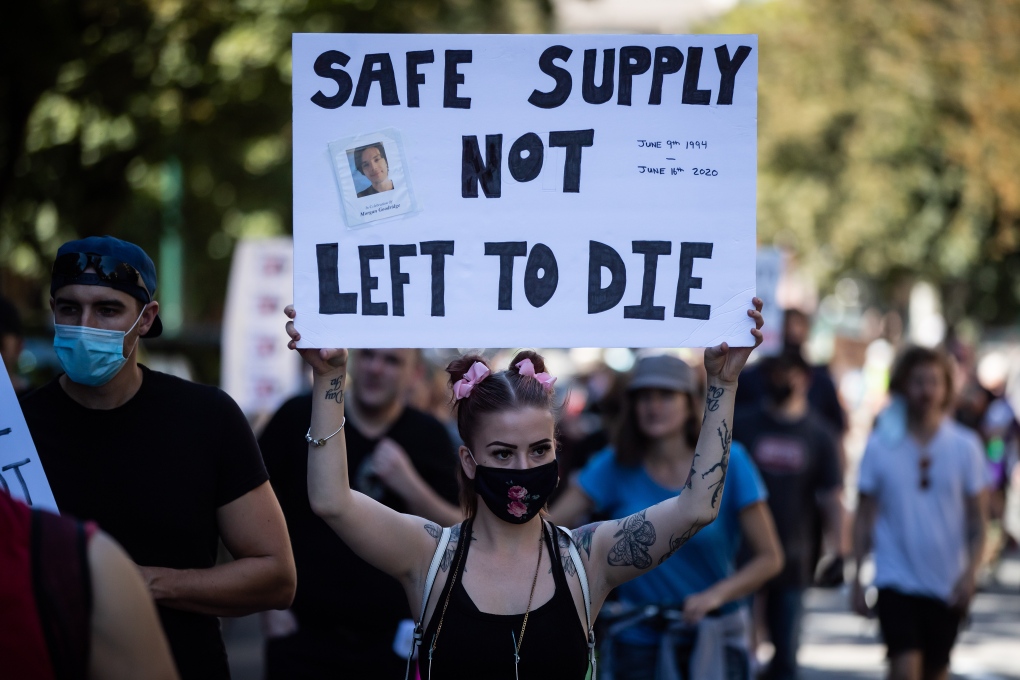Health Canada’s decision to allow British Columbia to again prohibit the use of illicit drugs in most public spaces will cause more deaths, the executive director of the Vancouver Area Network of Drug Users says.
“This is a bad move for both the provincial government and the federal government,” Brittany Graham said in an interview Wednesday. “We are going to lose more people and there’s blood on their hands.”
The initial decriminalization exemption in January 2023 had called for “meaningful and ongoing engagement with stakeholders,” but that did not happen before B.C. asked for the change, Graham said.
She said her organization sent a letter on Monday to the federal Health Ministry and the Mental Health and Addictions Ministry opposing the change.
Federal Mental Health and Addictions Minister Ya’ara Saks announced Health Canada’s approval on Tuesday.
“They didn’t read our letter. I never got a response back to it,” Graham said.
Premier David Eby said at a news conference on a separate issue Wednesday that the goal of decriminalization is to minimize risk to people using illicit drugs without compromising public safety. But the government heard from community members and police that they initially missed the mark, he said.
“There’s no question that, following our initial efforts on decriminalization, we had some unintended consequences, which was a spike in public drug use, where police were unable to use the authorities that we hoped that they would be able to use, namely arresting someone for being in a state of intoxication in a public place,” Eby said.
“As a result, people were feeling increasingly unsafe in communities, they were concerned about what they were seeing in parks and playgrounds and other places, and police were telling us they didn’t have the tools that they need.”
But Graham said the insinuation that public drug use had increased was incorrect and pointed to a March news conference where Vancouver police Insp. Phil Heard said his department had “seen a decrease in public complaints around public consumption.”
Graham said current solutions to the opioid crisis are not easily accessible. She said one VANDU member who wanted to access detox couldn’t quickly access services. Instead, she said they set up a tent outside St. Paul’s Hospital in downtown Vancouver so medical help was nearby while they attempted to detox on their own.
Incrementally increasing treatment beds isn’t helpful, she said.
“This is a crisis.”
Graham said stepping up policing will not fix the problem, which has claimed about 14,400 lives since 2016, and instead the province should be focused on more housing, overdose prevention services and improving welfare services.
“You’re not giving people any option right now, except for to be outside,” she said.
“This is going to hurt people who have housing as well,” she added, pointing to statistics from the BC Coroners Service.
The latest figures released Tuesday from the coroner on illicit drug deaths this year says 84 per cent of the deaths happened inside a home, shelter or hotel, while only 15 per cent of overdoses occurred outside in places like vehicles or parks.
Eby said Wednesday that the recriminalization of public drug use is “paired with initiatives to increase access to treatment and supports for people who are struggling.”
“We’re working and hope to launch soon a virtual clinic for people to be able to access methadone and suboxone,” he said. “These are treatment drugs that reduce cravings for opiates and also reduce the risk of overdose.”
B.C.’s request to Health Canada came after the province tried to make drug use illegal in public places with its own legislation, but the Harm Reduction Nurses Association challenged the bill in court.
Chief Justice Christopher Hinkson ruled in December that if the laws were enacted, “irreparable harm will be caused.”
The Harm Reduction Nurses Association said in a statement Tuesday that it was “deeply concerned and frustrated” by Health Canada’s decision, saying the move circumvents the injunction.
Karen Ward, a current drug user and drug policy advocate, agreed with the association’s characterization, saying B.C.’s request was “bypassing the judiciary, which is a scary thing and should alarm us all.”
“We’ve all been dehumanized, a marginalized outgroup that nobody cares about, and are barely human,” she said of drug users in an interview Wednesday. “People can resist that and I don’t see that happening right now. It’s such a wild violation of Canadian democratic principles.”
She said the best way to address all the issues associated with an unregulated drug supply — including crime, poverty, homelessness and overdose deaths — is to regulate it, “like we did with alcohol.”
“That’s what it’s going to take because this is a huge problem (and) it’s only going to get worse,” she said. “Treatment doesn’t address the drug supply.”
Graham suggested the move is more about politics ahead of a provincial election this fall rather than minimizing overdose deaths.
“Everyone’s just trying to win seats, whether they currently are elected, or want to be elected,” she said. “No one’s actually thinking about what will be best for the people who currently use drugs.”
This report by The Canadian Press was first published May 8, 2024.







